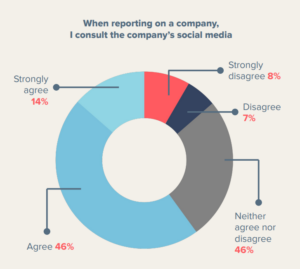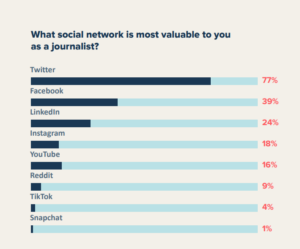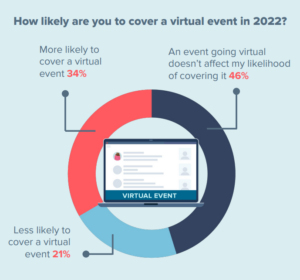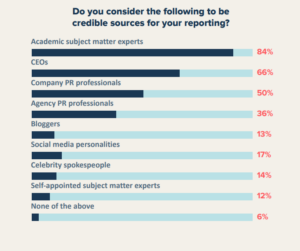Beyond the press release, here’s what journalists think about your communications
From social media to events, here’s what journalists really think of your efforts to grab their attention.

With media relations, it’s easy to obsess over pitches and press releases. But the press interacts with your company and its communications in so many other ways. Are you ready for them?
A recent survey from Muckrack asked journalists their opinion on current media relations tactics — and yes, you should check out the full survey to get full scoop on when and how to send your pitch. But there’s a lot more there, including how journalists view companies’ social media, CEOs’ value as potential sources and more.
There is good news for communicators: More than half (55%) of journalists strongly disagreed with the statement that the way companies share news is outdated. But 44% still think companies are behind the times. While progress has been made, there’s always room to continue to evolve.
Journalists are checking your social media
Sixty percent of journalists agreed or strongly agreed that they check a company’s social media accounts in the course of their reporting. Far and away, their social network of choice is Twitter, both for reporting (77%) and for their own news consumption (18%). Facebook (39%) and LinkedIn (24%) were the next most valuable for journalists in the course of their jobs.

(Image via Muckrack)
Are your social media accounts — especially your Twitter account — ready for the spotlight? Are your handles easy to find from your website or with a search of your name on the platform? Have you updated them regularly with information that the press might want to know, like on events, new initiatives and crisis response? If not, you’re missing an opportunity to engage with journalists in a place where they spend a lot of time — and plan to spend more.

(Image via Muckrack)
Thirty-nine percent of journalists plan to up the time they spend on Twitter in the coming year. Maybe you should, too.
Virtual events are still in
Even as conferences and events return in person after two years away, many journalists are still fans of the digital format. Only 21% of respondents said that holding a virtual event would make them less likely to cover it, while 34% said it would make them more likely to attend. The other 46% said that virtual or in-person programming didn’t affect their coverage decision.

(Image via Muckrack)
However, there are some beats that preferred in-person events, for some fairly obvious reasons. Food journalists, who can’t eat through a screen, were less likely to cover virtual events (27%), as were sports journalists (26%).
So, if you’re holding an event targeted specifically at the press, make sure you’re stopping to think through the advantages and disadvantages of online vs. in-person, and choosing the option that best suits your goals.
If you do choose virtual, however, journalists overwhelmingly preferred Zoom (62%). The next closest competitor was YouTube, with a meager 9%.
Trust in CEOs, PR pros as sources on the decline
The good news is that 66% of journalists think that CEOs are credible sources for reporting. The bad news: that’s a drop from last year’s 74%. The same goes for company PR pros, who also saw a decline in from 55% in 2021 to 50% in 2022, while agency PR workers were considered credible by just 38% of journalists.
These numbers still indicate high credibility in these sources; the only group that outpaced CEOs on credibility was academic subject matter experts (84%). Bloggers, social media influencers, celebrity spokespeople and “self-appointed subject matter experts” all ranked in the teens.

(Image via Muckrack)
Even as trust declines, there’s a chance for you to stand out by making your CEO and company spokespeople available, well-prepared and as transparent as possible.
How journalists view PR pros
While the relationship between the two camps can sometimes be fraught, most journalists don’t view PR as the enemy. But that doesn’t mean they want to get too cozy, either.
Sixty percent of respondents said they viewed their relationship with PR pros as “mutually beneficial, but not quite a partnership.” Only 8% were willing to call it a partnership, and 16% each called it “antagonistic, but not inherently a bad thing” and “a necessary evil.”
Can’t win ‘em all.
Learn more about the latest media relations trends and strategies by joining us in New York City for our Media Relations and Measurement Conference on May 11.







